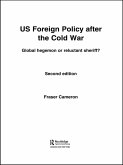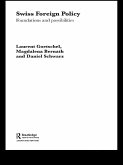This book provides a comprehensive overview of why European integration in foreign and security policy has proved so difficult. The obstacles to developing the common policy in this second pillar of the European Union go to the heart of debates around the sovereignty of the nation-state. A leading group of international contributors explain how these problems arise and consider the future prospects of developing a more regional-based solution.
Broadly organized around the three areas of policy, actors and issues, the first section traces the reluctant growth of EU integration in foreign and security policy as it developed from the mid-1980s. In the second section the national policies and interests that typically obstruct a common policy are explored through four key member states. The third section considers ways of addressing problems like the EU's expansion to include Central and Eastern Europe, the impact of an independent European security identity on the transatlantic relationship, as well as the potential risks to European security from the Mediterranean rim.
Broadly organized around the three areas of policy, actors and issues, the first section traces the reluctant growth of EU integration in foreign and security policy as it developed from the mid-1980s. In the second section the national policies and interests that typically obstruct a common policy are explored through four key member states. The third section considers ways of addressing problems like the EU's expansion to include Central and Eastern Europe, the impact of an independent European security identity on the transatlantic relationship, as well as the potential risks to European security from the Mediterranean rim.
Dieser Download kann aus rechtlichen Gründen nur mit Rechnungsadresse in A, D ausgeliefert werden.
`The chapters are well-written, providing very good summaries of the issues they address....Foreign and Security Policy in the European Union provides a good overview' - International Affairs
`[This book] is to be welcomed for shedding light on a relatively new and highly sensitive policy area' - European Foreign Affairs Review
`Few edited volumes are more than the sum of their parts, but this one is. The central question posed by this collection of essays is why closer harmonization in the EU's second pillar, Common Foreign and Security Policy [CFSP], is proving so difficult. The book responds to the question in three linked and mutually informing sections.... Eliassen has skillfully brought together a synergistic set of essays which leave the reader in no doubt about the complexity or magnitude of problems the EU faces in taking CFSP forward. In offering understanding rather than easy answers the book makes a valuable contribution to the literature.' - Political Studies
`[This book] is to be welcomed for shedding light on a relatively new and highly sensitive policy area' - European Foreign Affairs Review
`Few edited volumes are more than the sum of their parts, but this one is. The central question posed by this collection of essays is why closer harmonization in the EU's second pillar, Common Foreign and Security Policy [CFSP], is proving so difficult. The book responds to the question in three linked and mutually informing sections.... Eliassen has skillfully brought together a synergistic set of essays which leave the reader in no doubt about the complexity or magnitude of problems the EU faces in taking CFSP forward. In offering understanding rather than easy answers the book makes a valuable contribution to the literature.' - Political Studies









